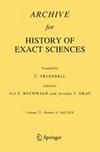希尔伯特的问题,康德和可决性
IF 0.7
2区 哲学
Q2 HISTORY & PHILOSOPHY OF SCIENCE
引用次数: 0
摘要
我在未发表的资料的基础上展示了希尔伯特对所有数学问题的可解性的信念是如何起源于与康德数学哲学的接触。此外,我还考虑了希尔伯特后来思考的数学问题的“可解性”或“可决性”的另一种意义:希尔伯特从克罗内克那里继承来的有限多步骤的可决性,希尔伯特通过反思克罗内克的方法论局限性而发展起来的“有限可决性”,以及20世纪20年代贝曼提出的决策问题。我认为,这些不同的关注点有不同的历史和传记根源,也应该在概念上保持不同。本文章由计算机程序翻译,如有差异,请以英文原文为准。
Hilbert’s problems, Kant, and decidability
I show on the basis of unpublished sources how Hilbert’s conviction of the solvability of all mathematical problems originated from an engagement with Kant’s philosophy of mathematics. Furthermore, I consider other sense of the “solvability” or “decidability” of mathematical problems which Hilbert thought about later: decidability in finitely many steps, which is an issue Hilbert inherited from Kronecker, “finitistic decidability” which Hilbert develops by reflecting on Kronecker’s methodological strictures, and finally the decision-problem as raised by Behmann in the 1920s. I argue that these different preoccupations have different historical and biographical roots, and should also be kept conceptually distinct.
求助全文
通过发布文献求助,成功后即可免费获取论文全文。
去求助
来源期刊

Archive for History of Exact Sciences
管理科学-科学史与科学哲学
CiteScore
1.30
自引率
20.00%
发文量
16
审稿时长
>12 weeks
期刊介绍:
The Archive for History of Exact Sciences casts light upon the conceptual groundwork of the sciences by analyzing the historical course of rigorous quantitative thought and the precise theory of nature in the fields of mathematics, physics, technical chemistry, computer science, astronomy, and the biological sciences, embracing as well their connections to experiment. This journal nourishes historical research meeting the standards of the mathematical sciences. Its aim is to give rapid and full publication to writings of exceptional depth, scope, and permanence.
 求助内容:
求助内容: 应助结果提醒方式:
应助结果提醒方式:


